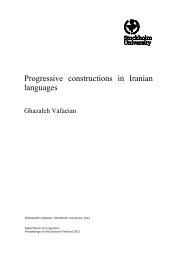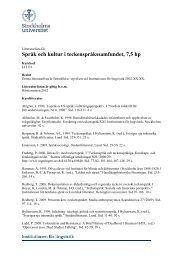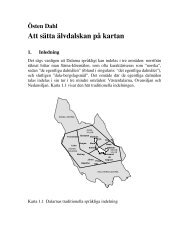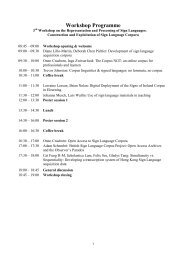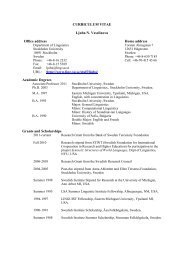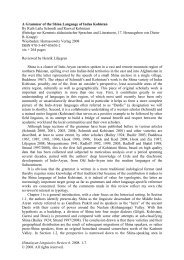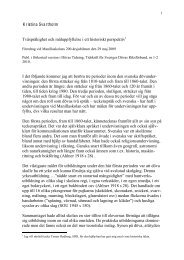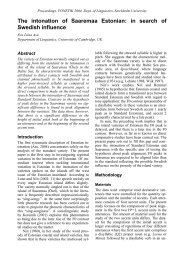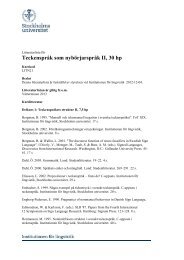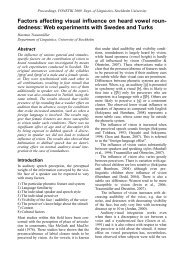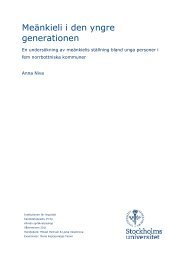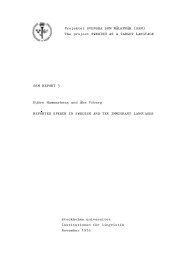Proceedings Fonetik 2009 - Institutionen för lingvistik
Proceedings Fonetik 2009 - Institutionen för lingvistik
Proceedings Fonetik 2009 - Institutionen för lingvistik
You also want an ePaper? Increase the reach of your titles
YUMPU automatically turns print PDFs into web optimized ePapers that Google loves.
<strong>Proceedings</strong>, FONETIK <strong>2009</strong>, Dept. of Linguistics, Stockholm UniversitySwedish phonetics 1939-1969Paul TouatiFrench Studies, Centre for Languages and Literature, Lund UniversityAbstractThe aim of the current project (“Swedish Phonetics’39-‘69”) is to provide an account of thehistorical, social, discursive, and rhetoric conditionsthat determined the emergence of phoneticscience in Sweden between 1939 and1969. The inquiry is based on a investigation infour areas: how empirical phonetic data wereanalysed in the period, how the disciplinegained new knowledge about phonetic factsthrough improvements in experimental settings,how technological equipment specially adaptedto phonetic research was developed, and howdiverging phonetic explanations became competingparadigms. Understanding of the developmentof phonetic knowledge may be synthesisedin the persona of particularly emblematicphoneticians: Bertil Malmberg embodied theboom that happened in the field of Swedishphonetics during this period. The emergence ofinternationally recognized Swedish research inphonetics was largely his work. This investigationis based on two different corpora. The firstcorpus is the set of 216 contributions, the fullauthorship of Malmberg published between1939 and 1969. The second corpus is his archive,owned by Lund University. It includessemi-official and official letters, administrativecorrespondence, funding applications (…). Thetwo are complementary. The study of both isnecessary for achieving a systematic descriptionof the development of phonetic knowledgein Sweden.Research in progressThe aim of the current project (“Swedish Phonetics’39-’69”) is to provide an account of thehistorical, social, discursive, and rhetoric conditionsthat determined the emergence of phoneticscience in Sweden during a thirty year period,situated between 1939 and 1969 (seeTouati <strong>2009</strong>; Touati forthcoming). The inquiryis based on a systematic investigation essentiallyin four areas: how empirical phonetic datawere analysed in the period, how the disciplinegained new knowledge about phonetic factsthrough improvements in experimental settings,how technological equipment specially adaptedto phonetic research was developed, and howdiverging phonetic explanations became competingparadigms.The claim sustaining this investigation isthat knowledge is a product of continually renewedand adjusted interactions between a seriesof instances, such as: fundamental research,institutional strategies and the ambition of individualresearchers. In this perspective, the inquirywill demonstrate that phonetic knowledgewas grounded first by discussions on the validityof questions to be asked, then by an evaluationin which results were “proposed, negotiated,modified, rejected or ratified in andthrough discursive processes” (Mondada 1995)and finally became facts when used in scientificarticles. Therefore, in order to understand theconstruction of this knowledge, it seems importantto undertake both a study of the phoneticcontent and of the rhetoric and the discursiveform used in articles explaining and propagatingphonetic facts. A part of this research is inthis way related to studies on textuality (Broncarkt1996), especially those devoted to “academicwriting” (Berge 2003; Bondi & Hyland2006; Del Lungo Camiciotti 2005; Fløttum &Rastier 2003; Ravelli & Ellis 2004; Tognini -Bonelli) and to studies on metadiscourse andinteractional resources (Hyland 2005; Hyland& Tse 2006; Kerbrat-Orecchioni 2005; Ädel2006).Understanding of the development of phoneticknowledge may be synthesised in the personaof particularly emblematic phoneticians.Among these, none has better than BertilMalmberg 1 [1913-1994] embodied the boomthat happened in the field of Swedish phonetics.The emergence of internationally recognizedSwedish research in phonetics was largely hiswork. As Rossi (1996: 99) wrote: “Today, allphoneticians identify with this modern conceptof phonetics that I will hereafter refer to, followingSaussure, as speech linguistics. Themuch admired and respected B. Malmberg significantlycontributed to the development ofthis concept in Europe”.208



